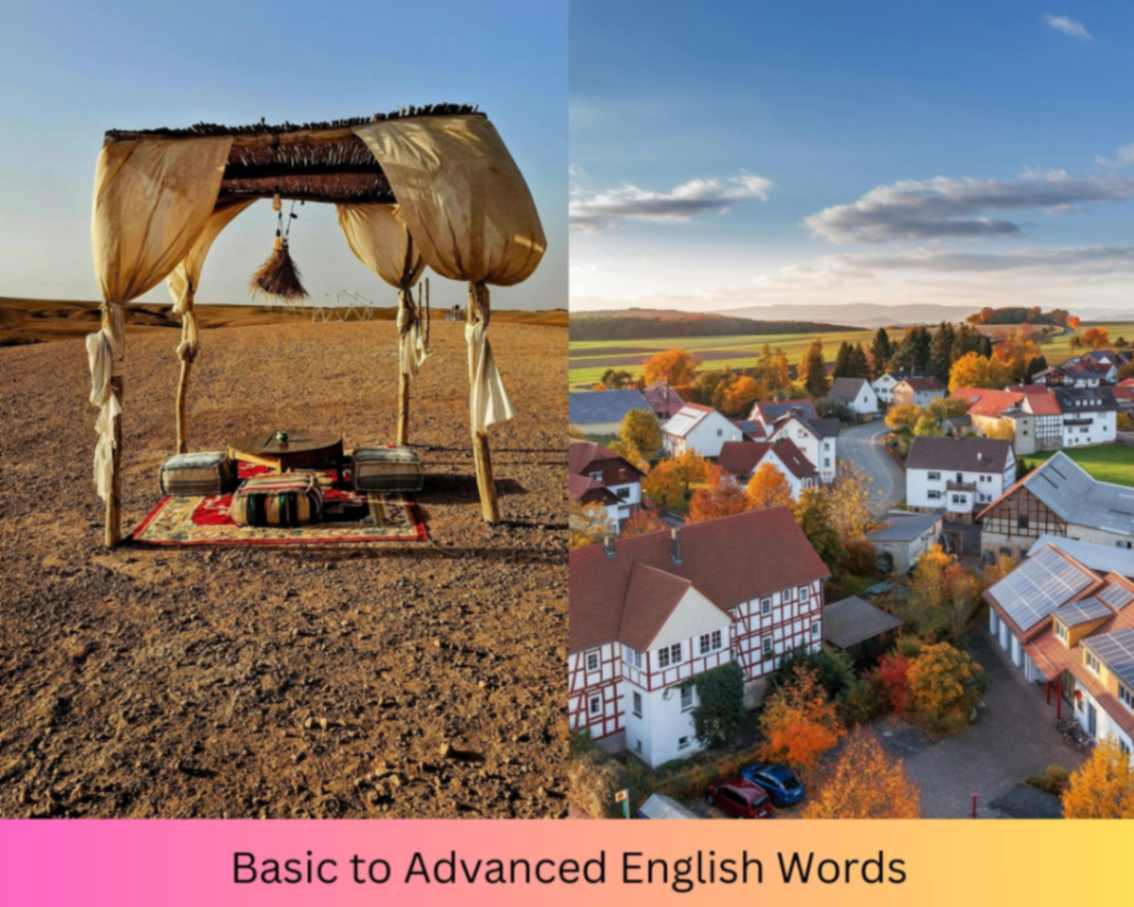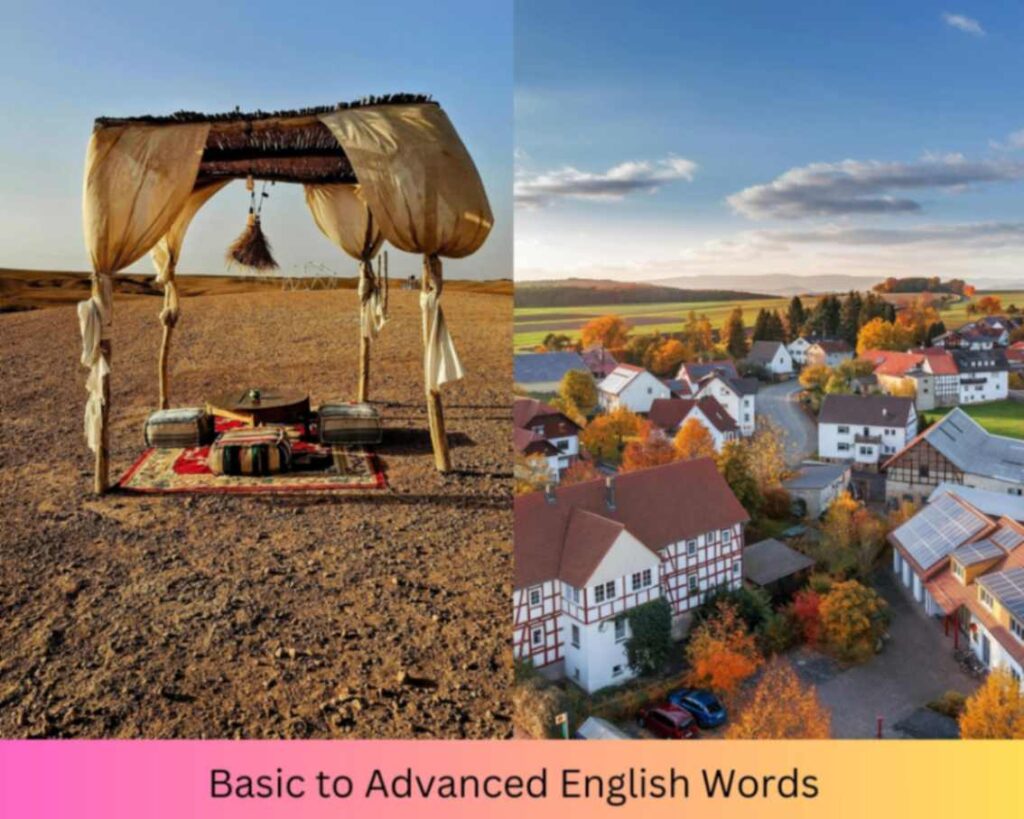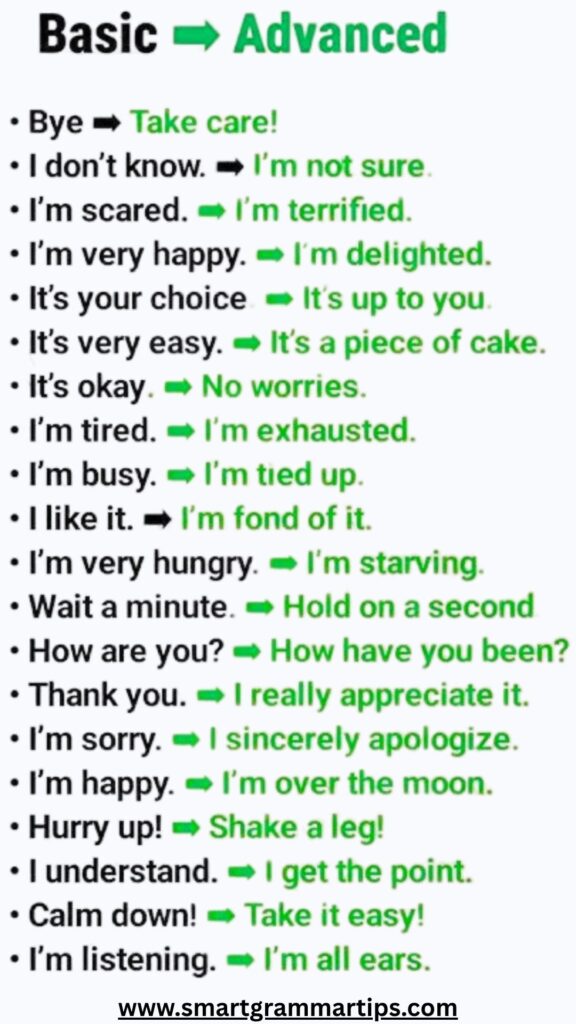Phone:
(701)814-6992
Physical address:
6296 Donnelly Plaza
Ratkeville, Bahamas.


Are you struggling to expand your vocabulary from Basic to Advanced English Words? This challenge affects many learners—kids, students, teachers, and mothers. It can be frustrating when you want to improve your English skills but don’t know where to start.
Thankfully, this article will solve that problem. We’ve created a simple guide that breaks down complex words into easy-to-understand steps. You’ll gain the tools you need to enhance your vocabulary, making learning enjoyable and effective.
Start today, and unlock the power of clear communication. With this guide, you’ll confidently progress from basic to advanced words, improving your reading, writing, and speaking abilities.
Basic vocabulary refers to commonly used, straightforward words that are easily understood by most English speakers. These words are often short, simple, and used in everyday conversations.
Example:
Basic: use
Advanced vocabulary includes words that are more specialized or formal, often found in professional or academic settings. These words tend to be longer and may require more advanced language skills to understand.
Example:
Advanced: utilize

It’s essential to know when to incorporate advanced vocabulary and when to stick with basic words. Here are some key situations:
Blog posts, emails, or social media should prioritize basic words for clarity and ease of understanding.
Example:
Basic: Find
Advanced: discover
Example:
Basic: job
Advanced: occupation
When in doubt, prioritize clarity. If a simpler word conveys your message clearly, use it. Only use advanced words when they add necessary depth or formality.
Understanding when to use basic or advanced words isn’t just about knowing more difficult words. It’s also about understanding the tone, register, and audience of your writing.
The emotional quality or attitude in your writing. Using advanced vocabulary tends to create a more formal or serious tone, while basic words often contribute to a more casual or friendly tone. Example:
Casual Tone: The movie was scary.
Formal Tone: The film was petrifying.
This refers to the level of formality or informality in language. Using the right register ensures your message fits the context. Example:
Informal: What’s your job?
Formal: What is your occupation?
Think about who will be reading your work. Using advanced vocabulary for a younger audience or non-native English speakers might cause confusion, while using basic words in a professional document may seem too simplistic.
Always consider the reading level of your audience. Choose your words to match their language proficiency, ensuring accessibility and engagement.
Unlike the competitor’s article, which only provides examples, here are practical steps to help you actively grow your vocabulary:
Expose yourself to different types of writing—news articles, academic journals, literature, etc. The more you read, the more vocabulary you’ll encounter.
Tools like Quizlet help you learn new words in a fun, engaging way.
Don’t just memorize definitions. Learn words in context by reading sentences or paragraphs where they are used. This helps you understand how to apply them in your writing.
Practice using new words in your writing and ask someone to review it. Writing in different styles will help reinforce your vocabulary.
Jot down new words you encounter and revisit them regularly to ensure they stick.
Now, let’s look at a broader list of basic vs. advanced word pairs, filling gaps in the competitor’s limited examples:
| Basic Word | Advanced Word | Usage Example |
| Say | Express | Basic: She says her thoughts clearly. Advanced: She expresses her thoughts clearly. |
| Help | Assist | Basic: Can you help me? Advanced: Can you assist me? |
| Look | Observe | Basic: Look at the stars. Advanced: Observe the stars. |
| Begin | Commence | Basic: Let’s begin the project. Advanced: Let’s commence the project. |
| Try | Attempt | Basic: He will try to finish. Advanced: He will attempt to finish. |
Use advanced vocabulary to create variety in your writing, but make sure the meaning remains clear.
When to Use Basic or Advanced Vocabulary
While the competitor briefly mentions different settings, this section will dive deeper into specific scenarios where basic or advanced vocabulary is best suited:
In casual conversations, emails, or social media posts, sticking with basic vocabulary is ideal. This ensures that your message is clear, quick to grasp, and relatable.
Example:
Basic: She looked at the stars.
Advanced: She observed the celestial bodies. (Too complex for informal use)
In research papers, theses, or scholarly articles, advanced vocabulary adds credibility and precision. It helps convey complex ideas in a more nuanced manner.
Example:
Basic: “he scientist looked for solutions.
Advanced: The scientist sought potential resolutions.
Business reports, proposals, or official emails benefit from a mix of basic and advanced vocabulary. The language should be professional but also easily understandable by a wide range of stakeholders.
Example:
Basic: Please check the document for errors.
Advanced: Please verify the document for any discrepancies.
In storytelling, you can experiment with both basic and advanced vocabulary to create different effects. Simple words can make dialogue sound natural, while advanced words add depth to descriptions.
Example:
Basic: The storm was scary.
Advanced: The tempest was terrifying.
To write effectively, it’s important to strike a balance between basic and advanced vocabulary. Here’s how you can achieve that:
Begin with basic vocabulary when introducing concepts or explaining key points.
Gradually incorporate advanced words as you delve deeper into more complex ideas.
Using too many advanced words can make your writing sound pretentious or difficult to follow.
Swap between basic and advanced synonyms to avoid repetition and create a richer reading experience.
Example:
First sentence: The researchers used various techniques.
Next sentence: The scientists employed numerous methodologies.
Different readers have different needs, whether they are beginners or advanced learners. Unlike the competitor’s article, this section will provide targeted strategies for building vocabulary based on the reader’s current level:
For those just starting out, focus on mastering the basic vocabulary first. Building a solid foundation will allow for smoother integration of advanced words later on.
Once comfortable with basic vocabulary, intermediate learners can start expanding into more advanced words. At this stage, context and repetition are key.
For those already familiar with a wide range of vocabulary, the focus should shift to using words more precisely and appropriately.
The competitor’s list of word pairs is limited, so this section will provide a more exhaustive list of basic to advanced word conversions to help enrich your vocabulary.
| Basic Word | Advanced Word | Usage Example |
| Start | Initiate | Basic: Start the meeting. Advanced: Initiate the meeting. |
| End | Conclude | Basic: The class ends at 4 PM. Advanced: The class concludes at 4 PM. |
| Think | Consider | Basic: I think we should leave now. Advanced: I consider it time to depart. |
| Build | Construct | Basic: They are building a house. Advanced: They are constructing a house. |
| Help | Assist | Basic: She helps her friend. Advanced: She assists her friend. |
| Eat | Consume | Basic: We eat breakfast at 8 AM. Advanced: We consume breakfast at 8 AM. |
| Stop | Cease | Basic: The rain stopped. Advanced: The rain ceased. |
It’s not just about knowing basic and advanced vocabulary—it’s about knowing how to use them effectively. Here are some common mistakes to avoid, which were missing in the competitor’s article:
Using advanced vocabulary just to sound impressive can often have the opposite effect. If your audience doesn’t understand the words, they’ll lose interest.
Avoid: “The inundation of information was overwhelming.”
Better: “The flood of information was overwhelming.”
Clarity should always be your primary goal. Use advanced words when they genuinely enhance your meaning, not just for the sake of using them.
Avoid: “The researcher utilized a multifaceted methodology.”
Better: “The researcher used a complex method.”
It’s important not to go overboard with synonyms, especially when writing for readability. Too many advanced words in a single paragraph can make the writing feel dense and confusing.
Avoid: “The participants elucidated their perspectives with candor.”
Better: “The participants explained their perspectives clearly.”
In this article, we explored the differences between basic and advanced vocabulary, providing practical strategies for using each effectively. We’ve also covered common pitfalls to avoid and expanded on the competitor’s limited examples of word pairs.
Remember, vocabulary choice should always reflect your audience’s needs. In everyday writing, keep things simple with basic words, but in professional or academic settings, advanced vocabulary can elevate your writing. By following the tips and strategies in this article, you’ll be well-equipped to navigate any writing challenge.
Start by incorporating a few advanced words into your writing each week. Practice using them in different contexts, and soon they will become a natural part of your vocabulary.
| Basic English | Advance English | Basic English | Advance English |
| Also | Moreover | Show | Demonstrate |
| And | In addition | Sing | Perform |
| Angry | Furious | Sleep | Slumber |
| Anyway | Nevertheless | Smile | Beam |
| But | However | Solve | Resolve |
| Gracious | Delighted | Stand | Upright |
| Hard | Challenging | Start | Commence |
| Lovely | Happy | Stay | Remain |
| So | Therefore | Stop | Halt |
| Because | Since | Study | Analyze |
| Big | Massive | Suggest | Recommend |
| Cheap | Inexpensive | Take | Obtain |
| Easy | Effortless | Teach | Instruct |
| Fast | Quick | Tell | Inform |
| Find | Discover | Think | Contemplate |
| Good | Excellent | Throw | Hurl |
| Happy | Joyful | Travel | Voyage |
| Help | Assist | Try | Attempt |
| Idea | Concept | Turn | Rotate |
| Important | Crucial | Understand | Comprehend |
| Interesting | Fascinating | Use | Utilize |
| Little | Small | Wait | Anticipate |
| Look | Glance | Walk | Stroll |
| Make | Create | Want | Desire |
| Old | Ancient | Wash | Cleanse |
| Place | Location | Watch | Observe |
| Rich | Wealthy | Wear | Adorn |
| Small | Tiny | Win | Succeed |
| Start | Commence | Wish | Aspire |
| Tired | Exhausted | Work | Labor |
| Understand | Comprehend | Worry | Fret |
| Use | Utilize | Write | Compose |
| Want | Desire | Agree | Concur |
| Weak | Fragile | Allow | Permit |
| Work | Labor | Answer | Respond |
| Bad | Terrible | Ask | Inquire |
| Calm | Serene | Bake | Prepare |
| Careful | Cautious | Begin | Commence |
| Change | Transform | Bring | Deliver |
| Clear | Evident | Build | Construct |
| Dangerous | Hazardous | Burn | Ignite |
| Decide | Determine | Buy | Purchase |
| Different | Diverse | Call | Contact |
| Do | Perform | Catch | Capture |
| End | Conclude | Change | Alter |
| False | Incorrect | Choose | Select |
| Get | Obtain | Close | Conclude |
| Go | Depart | Come | Arrive |
| Give | Provide | Cook | Prepare |
| Keep | Retain | Cry | Weep |
| Laugh | Giggle | Cut | Sever |
| Leave | Abandon | Dance | Boogie |
| Love | Adore | Decide | Determine |
| Mean | Signify | Drive | Operate |
| Move | Shift | Drink | Sip |
| Need | Require | Eat | Consume |
| New | Modern | Fall | Descend |
| Next | Following | Feel | Perceive |
| Quiet | Silent | Find | Discover |
| Real | Genuine | Finish | Complete |
| Right | Correct | Fly | Soar |
| Safe | Secure | Forget | Omit |
| Same | Identical | Forgive | Pardon |
| Short | Brief | Get | Acquire |
| Show | Display | Go | Proceed |
| Simple | Straightforward | Give | Donate |
| Stop | Cease | Help | Assist |
| Talk | Converse | Hit | Strike |
| True | Accurate | Hold | Grasp |
| Wait | Anticipate | Hope | Anticipate |
| Warm | Cozy | Hurry | Hasten |
| Wet | Damp | Improve | Enhance |
| Wide | Expansive | Invite | Summon |
| Win | Triumph | Jump | Leap |
| Worried | Anxious | Keep | Retain |
| Young | Youthful | Kill | Terminate |
| Achieve | Accomplish | Know | Recognize |
| Ask | Inquire | Laugh | Chuckle |
| Beautiful | Attractive | Learn | Comprehend |
| Begin | Initiate | Leave | Depart |
| Believe | Trust | Like | Admire |
| Best | Optimal | Live | Reside |
| Break | Fracture | Look | Gaze |
| Call | Contact | Lose | Misplace |
| Choose | Select | Love | Adore |
| Close | Shut | Make | Produce |
| Come | Arrive | Mean | Signify |
| Complete | Conclude | Meet | Encounter |
| Cut | Sever | Move | Shift |
| Dance | Boogie | Need | Require |
| Dark | Dim | Open | Unlock |
| Decide | Resolve | Pay | Compensate |
| Describe | Depict | Pay | Compensate |
| Die | Perish | Play | Participate |
| Discuss | Debate | Promise | Vow |
| Draw | Illustrate | Pull | Drag |
| Drink | Sip | Push | Shove |
| Drop | Let fall | Put | Place |
| Eat | Consume | Read | Scan |
| Explain | Clarify | Remember | Recall |
| Fall | Plummet | Run | Sprint |
| Feel | Perceive | Say | Declare |
| Find | Locate | See | Observe |
| Forget | Omit | Sell | Vend |
| Forgive | Absolve | Send | Dispatch |
| Free | Liberate | Know | Recognize |
| Give | Donate | Leave | Depart |
| Go | Proceed | Live | Reside |
| Hate | Detest | Look | Gaze |
| Hear | Listen | Lose | Misplace |
| Hold | Grasp | Make | Produce |
| Hope | Anticipate | Meet | Encounter |
| Hurry | Rush | Need | Demand |
| Improve | Enhance | Open | Unlock |
| Increase | Enlarge | Kill | Terminate |
| Keep | Retain |
In conclusion, learning Basic to Advanced English Words helps students, teachers, and parents build stronger language skills. These words provide a solid foundation for communication and problem-solving in everyday life. Whether you’re teaching or learning, mastering these words opens the door to better understanding and clearer expression.
Answer: Basic English words are simple, everyday words used in common conversations. They help beginners understand and communicate easily. Examples include “run,” “eat,” and “house.”
Answer: To learn advanced words, read more books, articles, and study vocabulary lists. Practice using these words in writing and speaking. It’s best to learn in small steps.
Answer: Basic words are commonly used in daily life, while advanced words are more formal and specific. Advanced words help in professional or academic conversations.
Answer: Knowing around 2,000 basic words is good for daily communication. For advanced proficiency, aim to learn 5,000-10,000 words.
Answer: Basic words build the foundation for learning a language. They are essential for understanding simple sentences and starting conversations.
Answer: Yes, by learning a few new words every day and practicing them. Reading and writing regularly also helps you improve faster.
Answer: Advanced words include terms like “intricate,” “exquisite,” and “extrapolate.” These words are often used in formal writing or discussions.
Answer: Use the new words in sentences and repeat them often. Creating flashcards or word games also helps with memorization.
Answer: Start by mastering basic words, then gradually learn more advanced words through reading, writing, and regular practice. Be patient and consistent.
Answer: No, basic words are enough for everyday conversation. Advanced words are more useful for academic or professional contexts.